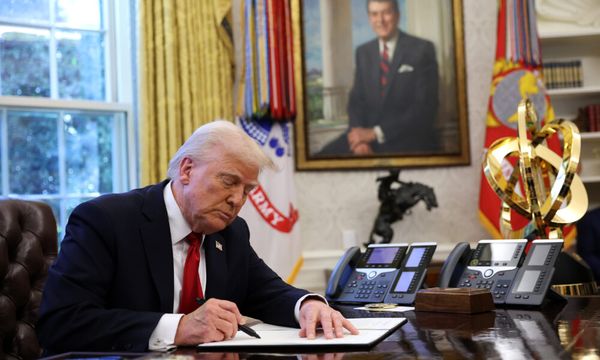Still waiting for a recession? Bob Auer, manager of one of the top mutual funds, says we're already in one.
"I really think we're in one now," said Auer, who runs the tiny $35.9 million Auer Growth Fund (AUERX) with his brother Paul and Eric McKenzie.
The fund's total net assets are small. But its performance is giant size.
While the broad stock market in the form of the S&P 500 is down 17.99% this year going into Wednesday, Auer Growth Fund is on a tear, up 13.39%.
It was the No. 1 performer as of Sept. 30 among all small-cap value funds tracked by Morningstar Direct. It was No. 4 among all U.S. diversified stock mutual funds, based on the oldest share classes.
Recession Is Here
Auer says he is no expert in how recessions are measured. "But I think we're in one now," he said. "Things have slowed drastically. ... We're probably in the second quarter of negative GDP (growth), even though (official government data) might still say it's up 1% or whatever. I think we're in a very mild recession. It's not drastic. It's very mild. But we're in one now."
Auer added, "The average person looks around. They think we're in (a recession) now. (Many people) are living week to week. That just doesn't seem like a non-recessionary time. People are cutting back everywhere to make ends meet."
Auer thinks official economic data understates economic stress. "Unemployment by government figures is (just) 3.5%. But the unemployment number doesn't measure how many people are not (looking for a job)," he said. "If you try to get a job for a year then you give up, you're not (counted as unemployed any more), which to me is crazy. You're not being counted."
Auer Growth Fund Soars
Auer Growth Fund's outperformance is no flash in the pan. The fund ranks No. 3 in its peer group over the past three years.
The fund's showing is a reminder that it's possible to carve out positive performance in a decidedly negative market haunted by the prospect of a recession.
The fund's three managers are Auer, his brother Paul and Eric McKenzie. Bob Auer has final say over buys and sells, he says.
How This Fund Invests
One key trait of the fund is that it is allowed to own stocks of any market capitalization.
The fund managers seek stocks that boast quarterly year-over-year revenue growth of at least 20% and earnings growth of at least 25%. They also want stocks trading at a price-earnings ratio below 12. "We are the true GARPy fund," Auer said. GARP means growth at a reasonable price.
Auer added, "What fund is looking to overpay for shrinking companies? We have the highest growth metrics. And our price metrics are half what even the deepest value funds are. So we are hyper growth and hyper value."
Recent Portfolio Changes
Auer and his colleagues invest stock by stock. But they weigh how macro factors make many stocks better or worse opportunities. In the past six months alone, the fund has trimmed its exposure to homebuilders because rising interest rates and fears of a recession mean it's likely that fewer homes will be bought and sold.
And the fund likes fertilizer companies more because the Ukraine war has constrained supply. Potash is a key ingredient in fertilizer. Intrepid Potash illustrates the fund's sell discipline as well as its buy triggers. The fund sells a stock once its share price doubles.
"China needs lots of potash to grow rice," Auer said. "China doesn't have a lot of their own potash, so they've got to get it from places that do. So China's buying a lot of fertilizer from Canada and Australia. One stock we really like is Intrepid Potash. We got some doubles in them. Then they requalified." So the fund bought the stock again.
Another fertilizer holding is Canada's Nutrien. "We picked it up shortly after the war started. We bought it in February (2022) at 75.11. Now it's trading around 83. So it's up about 10%. That's not dramatic — unless you think about all the stocks that are down 10%."
Earnings per share were $6.22 last year. They're seen hitting 16.21 this year. That would be a rise of 161%. "Sales are projected to go from $26 billion to $39 billion," Auer said. "That's amazing."
Cross Country Staffs Hospitals
Leeway to hold stocks of any market capitalization is not the fund's only flexible trait. The portfolio is also diversified among sectors, with 30% of shareholder money at work in energy names as of Aug. 31. An additional 19% were in basic materials, 16% in industrials and 11% in technology stocks.
Health care is the fund's sixth-largest sector with a 5% weighting, after consumer cyclical's nearly 11%.
Cross Country Healthcare provides health care staffing and outsourcing, especially of nurses and doctors. "One of the biggest problems in the country is that hospitals can't keep their people," Auer said. "(Clients) call and ask for X number of doctors and nurses, and Cross Country provides them."
Higher pay rather than fears of recession appears to be the key, Auer says. Clinical research associates, clinical safety associates and staffing managers at Cross Country got paid 18% to 26% more than the national averages for those jobs, according to an informal, random sampling of jobs listed at CareerBliss.com.
Cross Country was the 200th holding to double since the fund's inception at the end of 2007.
The fund began its stake in May 2021. With additions over time, the fund's weighted average cost became 17.60. The fund sold its entire stake on Oct. 18 at 35.23 once the position had doubled in value. "Our specialty is looking for stocks trading (at) half what we feel they should be the day we buy them, and not trying to hold them as they swing to overvalued," Auer said. Shares are up 30% this year.
Cross Country was a member of the IBD 50. The IBD 50 is IBD's flagship screen of leading growth stocks that show strong relative price strength and top-notch fundamentals.
Recession No Challenge For Paccar
Paccar makes trucks and aftermarket parts. The manufacturer is up 5.1% so far this year.
Its brands include Peterbilt and Kenworth. Auer calls the company the premier truck manufacturer in the U.S.
Paccar's challenges are routine and relatively minor, Auer says. And they're unrelated to any recession. Paccar says it is increasing its dividend by 9%, which Auer calls a token raise.
The company also said this past week it is recalling 76,462 trucks because their digital dashboards can freeze. The problem appears to be fixable with a software flash update, rather than a more expensive replacement of dashboards and circuits, Auer says.
On Tuesday, the fund added to its stake in Paccar after the manufacturer reported better-than-expected third-quarter earnings. Paccar reported EPS of $2.21, a 103% increase, on a 37% sales jump to $7.06 billion.
Follow Paul Katzeff on Twitter at @IBD_PKatzeff for tips about retirement planning and active mutual fund managers who consistently outperform the market.







